#card captors clear
Explore tagged Tumblr posts
Text


#oficial art#ccsakura#cc sakura#sakura cc#ccs#sakura card captor#clamp#card captor sakura#clear card#clear card arc#sakura clear card#card captor sakura clear card#kinomoto sakura#sakura kinomoto#カードキャプターさくら#ccさくら#clear card hen#kerberos#kero chan#kero#kero cardcaptor sakura#spinel#mahou shoujo#magical girl
2K notes
·
View notes
Text
The amount of times Touya's 6 foot something ass has tried to throw hands with a elementary schooler is insane





BRO WAS NOT HAVING IT had that little boy crushing on his boyfriend and his sister Touya was finna put his ass in check LMAO
#cardcaptor sakura#cardcaptor sakura clear card#sakura card captor#touya kinomoto#why is touya so fine#syaoran li#syaosaku#touyuki#sakusyao#clear card arc
304 notes
·
View notes
Text
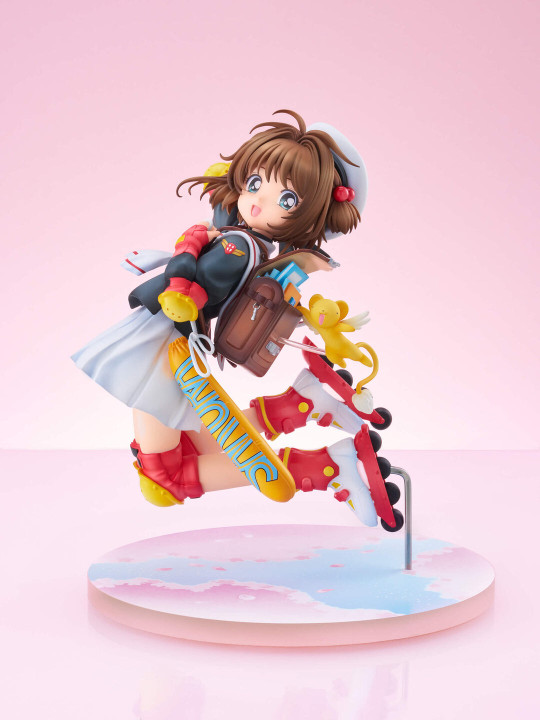
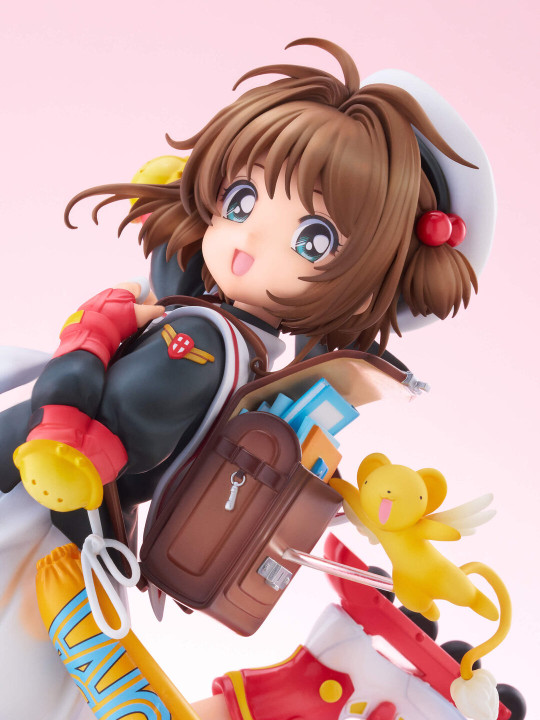
Kinomoto Sakura ; Card Captor Sakura ☆ FuRyu
#sakura kinomoto#kinomoto sakura#sakura avalon#ccs sakura#sakura figure#sakura#card captor sakura#cardcaptor sakura#ccs#ccs figure#cardcaptor clear card#card captor clear#cerberus#ccs clear card#keroberos#kero chan#furyu#anime#anime figure#figure#anime figurine#figure collecting#figurine#scale figure#anime collecting#myfigurecollection#manga
983 notes
·
View notes
Text
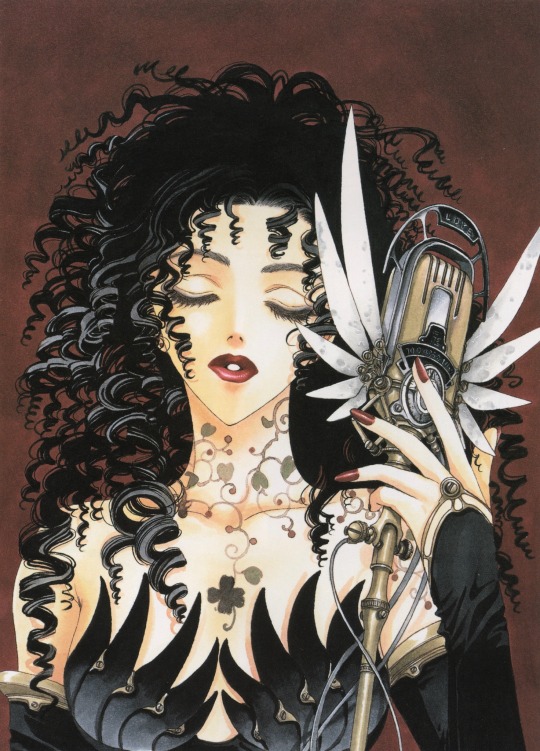
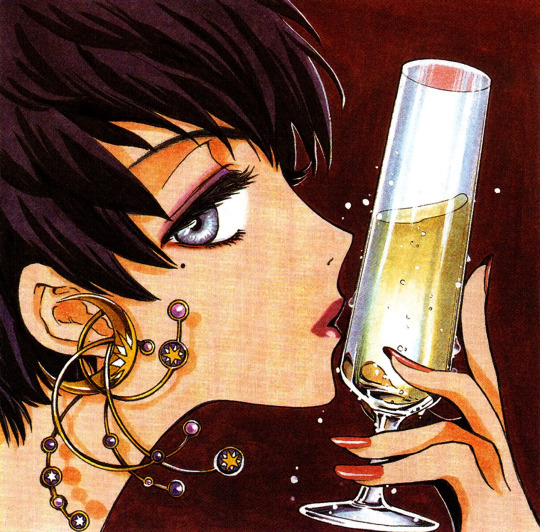
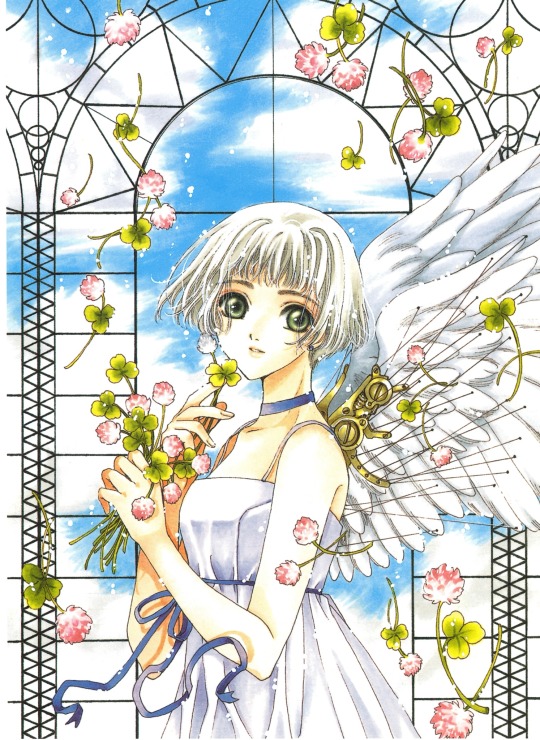
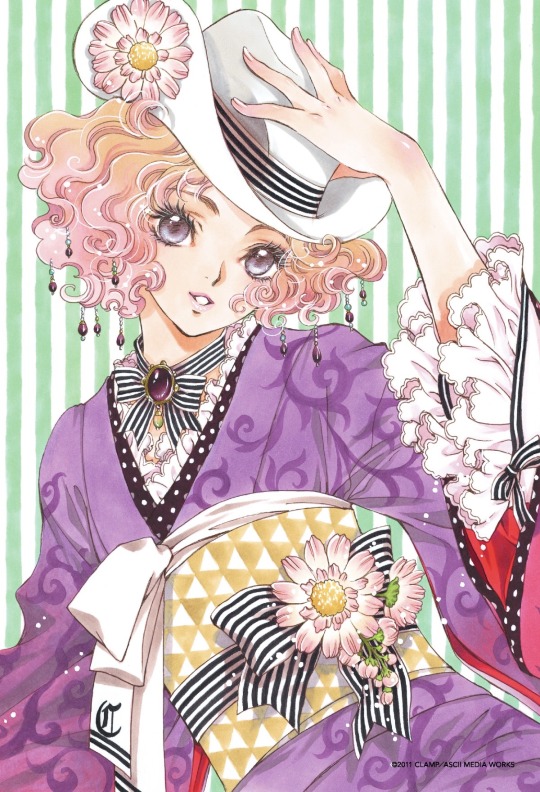


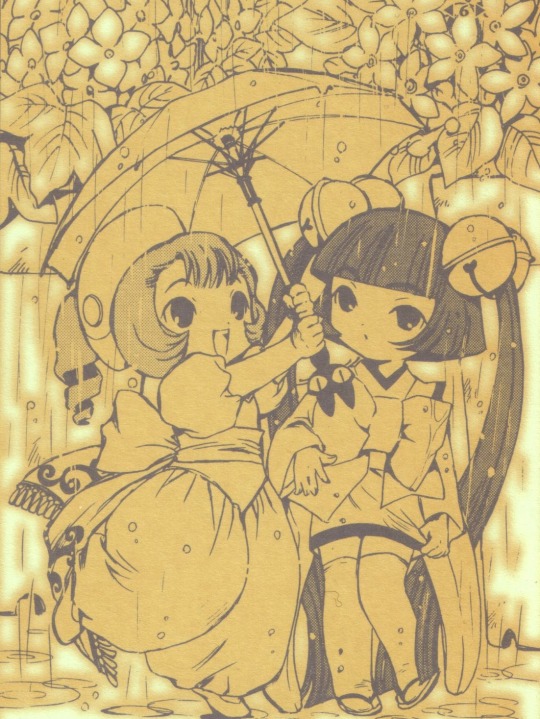
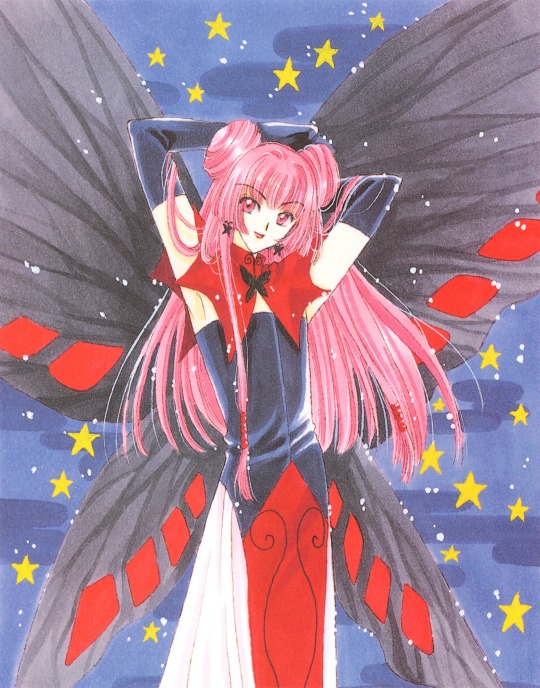
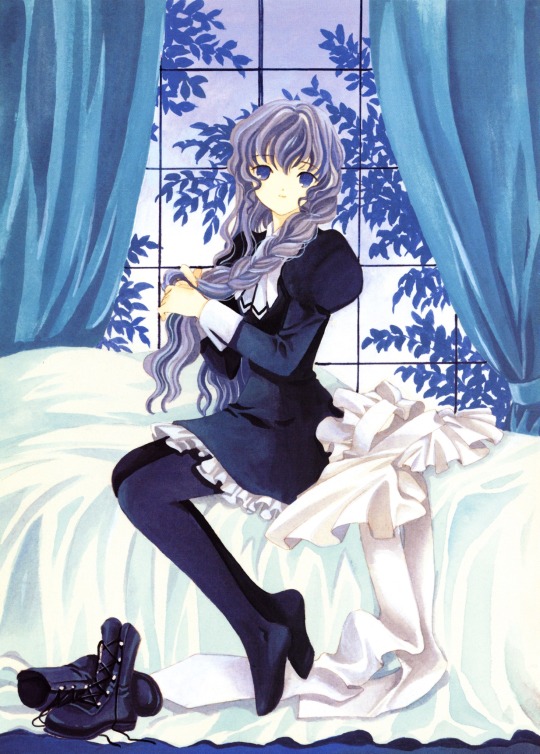
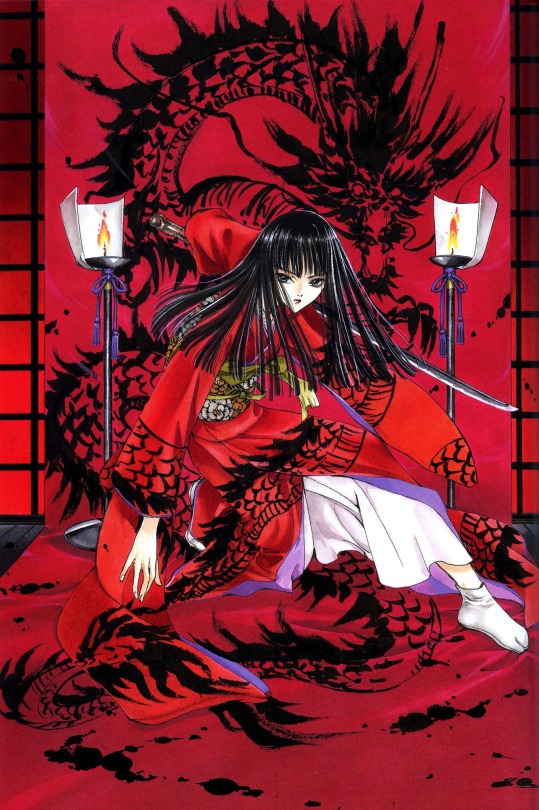
CLAMP - Girls
#clamp manga#clamp#clamp anime#clamp in wonderland#tsubasa reservoir chronicle#tsubasa chronicle#tsubasa chronicles#tsubasa rc#cardcaptor sakura#card captor sakura#cardcaptor clear card#card captor clear#tsubasa tokyo revelations#clover#x#x1999#x 1999#xxxholic#xxx holic#tokyo babylon#tomoyo daidouji#sumomo#arashi#kishu arashi#kishu#kotoko#nadeshiko#kinomoto nadeshiko#maru#oruha
701 notes
·
View notes
Text






✨️
#sakura kinomoto#sakura card captor#sakura clear card#manga icons#clamp manga#messy icons#sakura icons#card captor sakura#anime icons#manga layouts#edgy moodboard#cute icons#soft icons#coquette#messy headers#messy packs#anime layouts#anime headers#anime packs#dividers#kinomoto sakura#sakura cardcaptor#clamp icons#anime pfp#twitter layouts#twt icons#cute art#clamp#cardcaptor clear card#cardcaptor sakura
212 notes
·
View notes
Text


#sakura card captor#sakura clear card#manga cap#shoujo#shoujoedit#shaoran li#sakura kinomoto#mangasedit#manga edit#mangacap#manga panel
288 notes
·
View notes
Text

creature naps :)
#cardcaptor sakura#card captor sakura#clear card#sakura kinomoto#kero#spinel sun#momo#ccs#my art#digital art
234 notes
·
View notes
Text
Sakushao 🌸✨









❥ ; Card Captor Sakura: Clear Card-hen ─ Ending 1; Jewerly by Saori Hayami
#anime de romance#maho shojo#sakura card captor#cardcaptor sakura#sakura kinomoto#shaoran li#Sakushao#Sakura x shaoran#Card Captor Sakura: Clear card#shojo anime#shojo#shoujo anime#shoujo#anime gifs#anime gif#my galery ♡
229 notes
·
View notes
Text





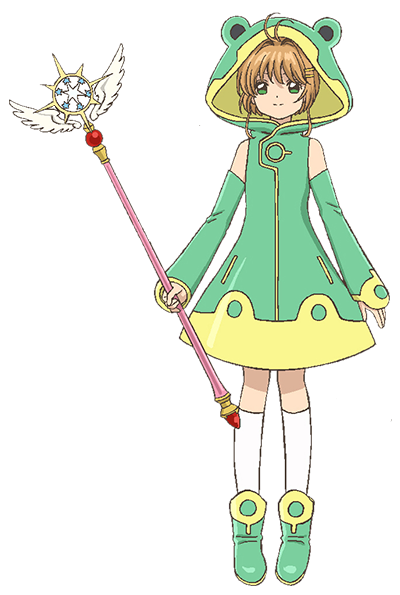






#cardcaptor sakura#cardcaptorr#card captor sakura#ccs#sakura kinomoto#cardcaptors#kero#ccsakura#anime and manga#anime#tumblr polls#i love polls#poll time#my polls#fandom polls#polls#clear card arc#cardcaptor clear card#card captor sakura clear card#sakura card captor#sakura clear card#clear card
65 notes
·
View notes
Text

Thank you clamp for creating sakura
#mine#anime figure#cardcaptor sakura#card captor sakura clear card hen#sakura kinomoto#anime figure collection
59 notes
·
View notes
Text
Clamp Art Style Analysis: Part 1: Creation Process and Materials
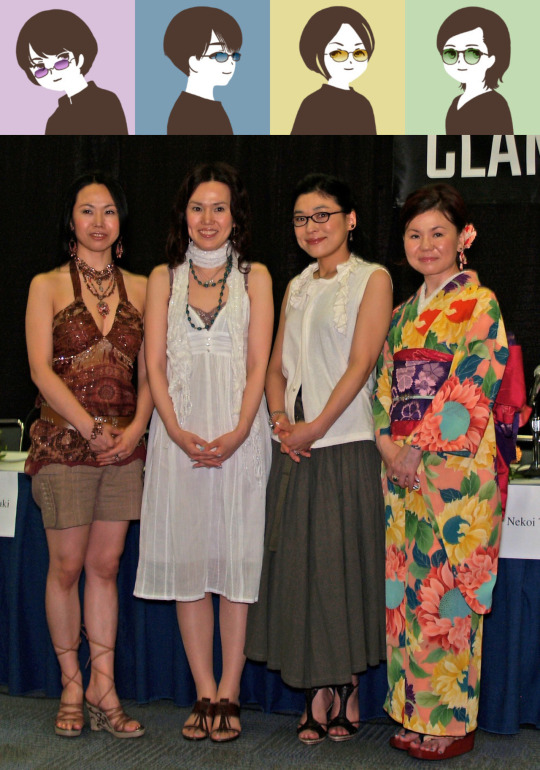
Introduction
Clamp is a manga artist team of four women. They are a prominent distinguished manga artist team known in the West and in China. The thing they are most recognized for is their highly detailed art style many people may have known and many may not. They did several manga you might have known such as Card Captor Sakura, Chobits, and even Tsubasa.
Clamp is one of the artists whose art style I highly admire and want to imitate in my art. I created this post so I can understand and take apart their art style and better understand it. It is going to be difficult since there are four people with different specialties and years of professional experience in their belt. They are constantly changing and adapting to every genre.
I am going to analyze Clamps’ art style in this post and this may take a while to crack due to how extensive the Clamp style is. I am going to pile up everything and explain this in this post which is going to take time to explain in this post. I am going to take apart interviews from different sources while explaining their art style in this post.
I am going to examine their art style and the materials they use. I am going to split into sections talking about the art style and what they use for materials for the manga.
To understand the art style and how it is defined I need to understand Clamp themselves since they created an entirely individual style that is going to talk about other things, not about the art style there is going to be so much I might miss while explaining in this post. I could be wrong while explaining this is an analysis I am going to take my crack at understanding the art style.
Influences
Though the members of Clamp are largely self-taught they are inspired by many figures that influence their art. The list consists of Reiji Matsumoto, Osamu Tezuka, Go Nagai, Hirohiko Araki, and Moto Hagio. The other works that influenced Clamp are animated cartoons and Galaxy Express 999. Reiji Matsumoto and Osamu Tezuka are major influences in their works Clamp used Osamu Tetsuka’s star system in their works which is seen often in the crossing over of characters from their series into their other works. You can see this prevalently in Tsubasa, X, and Kobato where you would find characters from the different series crossover.
Nekoi's favorite cartoonist was Moto Hagio in high school and Mokona mimics pictures by Reiji Matsumoto when she was younger.
While working on manga Nekoi started copying Shinji Wada and Rumiko Takahashi, in which She copied her art in drawing legs. She drew them thick and big. She liked the legs Rumiko Takahashi drew since they seemed long until short feet. She took them to make them more delicate and feminine. Clamp used other artists to help them while drawing.
Go Negai influenced the creation of X, taking inspiration from his work of Devil Man featuring two main male characters, and the murder of the lead's sweetheart triggers the apocalypse. Devil Man is used in creating x The extreme levels of violence depicted in X came from Go Negai's works. Clamp knows about Devil Man. They did a doujinshi of Devil Man in their works as doujinshi artists a while back and even had a doujinshi about the lead character's relationship in their works.
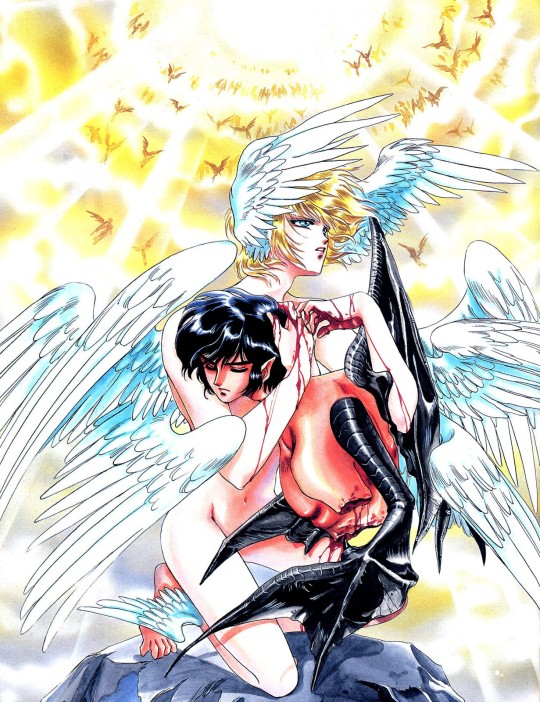
X was inspired by Go Nagai the heavy violence in x inspired from Go Nageis works and the assembled cast of x is inspired by Kyokutei Bakin's Nansō Satomi Hakkenden, The fight sequences of x were inspired by the manga Dragon Ball specifically Akira Toriyama's use of white backgrounds.
Mokona influences are H.R Giger and gérard di-maccio are used for the RG veda backgrounds.
Mokona likes Alphonse Mucha who is a considerable influence in drawing XXXHolic art.
Hirohiko Araki is another influence of Clamp with JoJo's Bizarre Adventure fan manga back when they drew doujinshi and starred in Clamp in wonderland animation with Jojo animated.

They drew a doujinshi on Jojo a while back starring Josuke and Kakyon and even they drew Jolynn once.
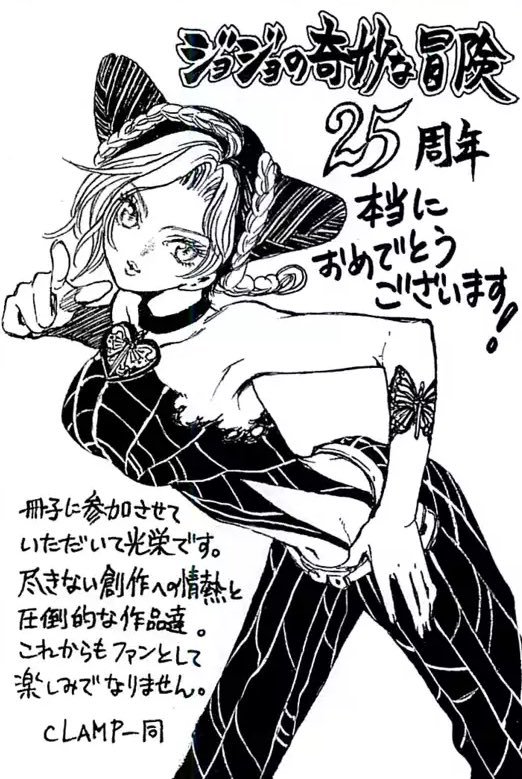
There is a lot of Kakyoin and Josuke fanart with Yaoi art drawn by these two characters.
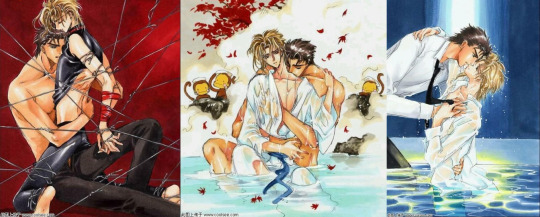
Jojo was used in drawing wish with Kohaku and Shuichiro strongly resembling Jotaro Kujo and Noriaki Kakyoin and Kohaku's hairstyle strongly identical to Kakyoin and Shuiichiro resembling Josuke.
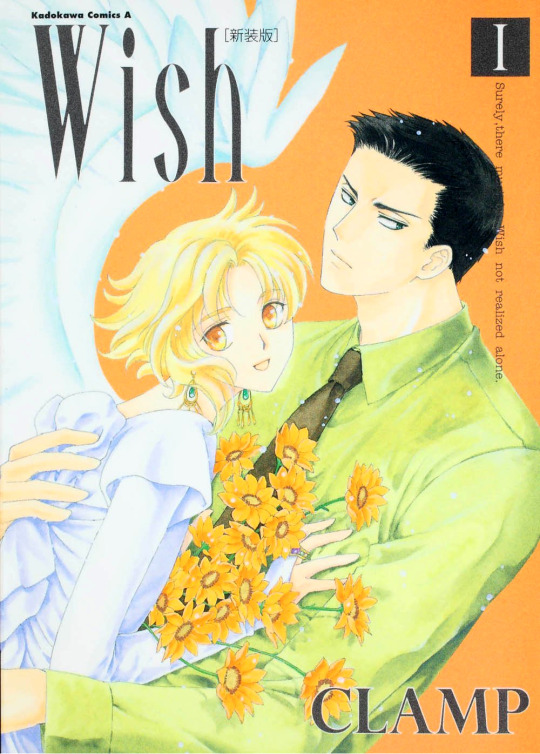
Members
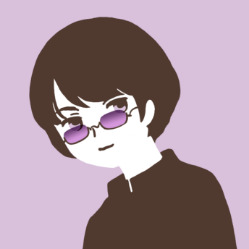
Nanase Ohkawa
The main leader of the group, the main writer of the scenario, is in charge of the original story, script, and design. The other three artists are Mokona, Nekoi, and Satsuki, who are in charge of the art.
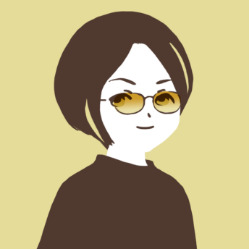
Mokona
Mokona is the artist and designer in charge of drawing. Mokona is in charge of sketching out the construction of the characters by hand. Mokona draws the storyboards and sketches out the characters. Mokona is responsible for drawing female characters.
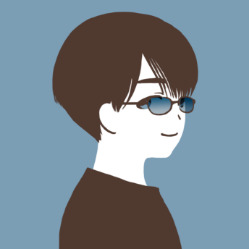
Tsubaki Nekoi
Nekoi is in charge of character design, background scenery, finishing touches, and charge of the foundation of the art in their works. Her booth has been painted for design and screens for finishing touches.Nekoi likes to doodle and throw pages. Nekoi is in charge of drawing male characters.
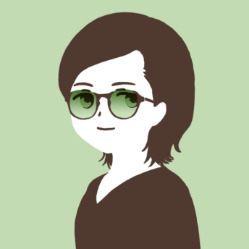
Satsuki Igarashi
Satsuki Igarashi is in charge of design and drawing and is in charge of the finishing touches. She is in charge of designing the cover of the book itself.
Bio
Three members of Clamp were classmates in high school who took art-focused classes in school; none of them studied at school for manga. Nekoi tried using colored pencils and opaque watercolor in school when she was young. Satsuki and Nekoi were in middle school when they first started drawing manga. Mokona was in an art club in middle school. In high school, she started drawing manga with proper frames and dialogues. Mokona, Nekoi, and Igarashi studied art in high school Nekoi, Mokona, and Igarashi met in high school as a kid She found a friend who loved manga, Satsuki went to an art-type highschool and Mokona high school and college had art-focused classes, Igarashi was at an art department in highschool then to computer graphics vocational school. Clamp started as doujinshi artists who first published doujinshi fanzines Back then they had more people it went down to four in the year of their commercial debut.
The group never worked as assistants with most of the members being self-taught with Tsubaki and Nekoi being more self-taught.
They never used assistants to help them with their work since they wouldn’t be able to understand the years of jargon they created among themselves They created work for years without any help from assistants since assistants would slow them down and wouldn’t understand when we would tell them to do the same thing as before disrupting the workflow they created for work.
For inspiration, Ohkawa gets her ideas from dreams or inspiration based on events she hears or sees on the news a lot of times its deadlines. Ohkawa doesn’t always take notes and she usually loses ideas.
Clamp’s daily work hours while working on manga is in the morning, get in the studio at about 10 or 11 in the morning and in the afternoon they eat dinner at 6 in the evening then stop working at midnight.
The members share a single workspace and are separated into three booths while they work.

There are four separate studios and the member's workspace accommodates all four of them. Clamp work requires complete perfection with members having their own space where they have to work to create one of their works
The art of Clamp is lush layered and amazingly detailed. It has a high-quality art style with extensive details. Due to this, it's almost difficult to adapt to animation.
Each of Clamp’s titles has a different art style depending on the genre or magazine they are running in; their art styles change to suit the work and magazine the manga will appear in. The art style of the work is based on Ohkawa’s decision in charge of the art direction of the work. The art styles and pictures have changed but not their methods.
There is a lot to talk about the Clamp art style which may not be enough to explain one segment
Creation process
Clamp's work process is similar to an animation production; they work like a small animation studio. if you look closely at the work process for creating works it's more like an animation with the director, playwright, character designer, painter, background artist, creator, and publicist treating the manga or story like a script for a movie or anime, the creative process for creating manga is similar to that of animation and movies.

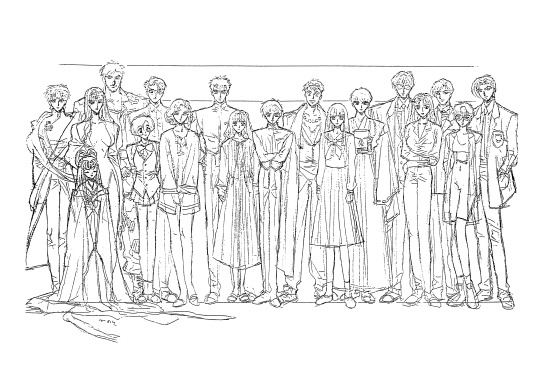
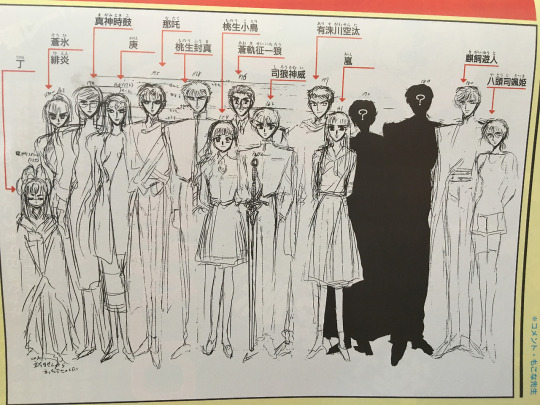
Ohkawa is the storyteller and writes the scripts other three draw drafts and original design, Mokona is the chief character designer, and Tsubaki and Nekoi work for the background Sometimes they they take turns doing different jobs
Ohkawa writes then it goes to Mokona who draws out the outline of the storyboard and sketches the characters
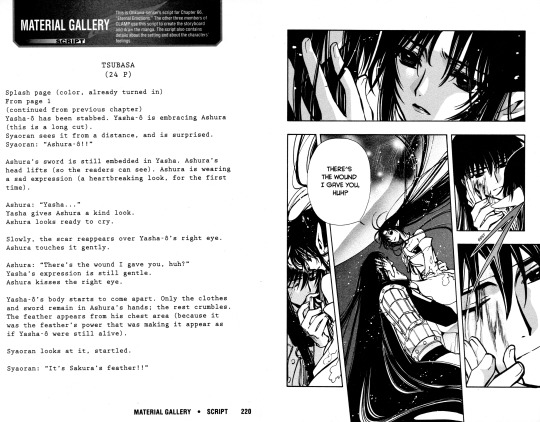
They would normally go to Nekoi for the finishing touches Igarashi and Nekoi work on the final touches the team may shuffle roles. Clamp members do get outside work with computer graphics. For drawing sometimes the members do character backgrounds or may draw everything depending on the story. They have a work where one person designs the character and another draws the actual story. They make storyboards and start drawing. Sometimes they decide who is going to make storyboards and then start drawing. The art is drawn by Satsuki, Mokona, and Nekoi, Nekoi draws the rough draft and thinks about how the story is going forward to next month's script. The designs are handled by Satsuki and Mokona. Satsuki worked on the design for the cover page. In the beginning, they believed that everything in the comic from front to back was important to the story. They take turns completing the rough sketch depending on the story. They divide the story into frames; they mostly draw it on art board paper after they create characters and scripts. Ohkawa explains what in each frame props and the characters in they have how they turn around and include emotions in the panel. Ohkawa and Igarashi never drew manga with split frames. They Look like frames from a movie
When Ohkawa comes up with stories Ohkawa drafts the outline of the story and the story setting The ending for each story is determined from the last scene back to the first scene and the end last and deciding the thing and heading into this way makes way for change drags the reader along for the story Ohkawa drafts the outline the other three members formulate characters designs by creating character profile sheets to avoid confusion. Ohkawas style of writing is considered a color woodblock print in the way it conveys and portrays things the manga is close to picture books and elimination of everything unneeded. Ohkawa thinks about the setting of where the story takes place and Ohkawa constructs a visual image at least in their head then splits up panels in their manga. for the writing process, they come up with the story Ohkawa gets together to discuss the story with the members about the purpose of the story and the main characters when writing and drawing After the members get well used to the story they write it down when creating a story for a weekly magazine they first decide on a rough story from beginning to end Ohkawa works backward from the ending for the story to have an ending like this the members don’t always know how the story develops. Ohkawa's style of writing for stories is not telling anyone the progression of the storyline before it happens reason for that is that when the members of Clamp learn of Hokuto's death one of the members couldn’t draw Hokuto's smile the same way this is how badly shaken they were since that the way Ohkawa created her stories changed for most of the works it was until Chobits she could tell them again. Ohkawa kept using memos in the beginning when she wrote the stories where she kept track of the flow of the story.
Before they start drawing they decide the flow of the story up until the end as well as the materials used for color and monochromatic drawing and the direction of the illustration. The members consider the art style during the planning stage and the materials for the manga, for materials Clamp uses color samplers In the order of how they draw. They draw them the same size as manuscripts, they draw rough sketches, and the size of the manuscript is b4 size and genkou size. They seldom use computers to create manga but only to color pictures, sometimes Clamp uses the scanning method when they draw or draw the rough draft using tablets. They don’t use references for their designs except at one time for Ohkawa she drew inspiration from a perfume and drink package she gathered together she drew more influence from the business art and art from Alan Chai's design.
The amount of lines and the thickness of the lines in the manga depends on the work. When you look at the manga, there are a lot of lines in the characters, Clamps can make the lines, and the thickness of the lines depends on the nature of their work from the thicker lines shows how serious and heavy the story thicker lines match the nature of their work that fits with a heavy theme like works like Tokyo Babylon, which have a heavy atmosphere. Mokona draws with thicker lines and uses pens with strong pressure when drawing. Clamps drawing methods changed with Tsubasa and xxxholic.
In the process of launching a serialization first is to decide on the major storyline work out the details of the characters later and consider the number of chapters needed to tell a story, second Ohkawa has a meeting with Mokona and Nekoi to decide on the design of the main characters Ohkawa asks for designs once they are finished they go over one more time. They go about creating manga and have two processes, one creating a manga based on the request from a publisher The second Clamp decides on the story first and then thinks about the magazine to write it for. Clamp comes up with an outline for the story First after they create the outline they discuss who's going to draw pictures or if they all draw together. They turn the project into a movie telling how a story goes and who the main characters are among themselves. They talk about the rough story and how they should do it when they bring a story to the publisher, attach the rough story and characters, attach characters' settings to them and draw the appearance in the manga to the publisher. Then after they show the work to the editor if the editor thinks it's okay they start the story. After receiving approval from an editor, Ohkawa assigns roles to each group member and then chooses the visual styles depending on the factors such as the complexity of the story and chosen art style the artwork depends on the genre and magazine of the story. Ohkawa provides a rough draft for each chapter with things such as dialogue panel size props and movement and characters' emotions. Storyboarding takes 12 hours while the script takes 8 hours to write. To Mokona from rough draft to inking 10 pages per day, the average Mokona puts into how many pages of black and white manuscript draws in a day the number of pages they draw in a month to finish one installment For example if they're in two monthly publications like Tsubasa and xxxholic one is about 19 or 20 pages other takes one day to finish 6 pages for the foundations for the fishing touches and inking takes a couple of days every 2 weeks when it comes to two weekly series its 120 and 130 pages a week. xxxholic takes two days and x took four days
Ohkawa will specify the proper production for the story and character. After the story, they will choose a person to perform the character design. Clamp switches up who works on character design and the drawing. Igarashi and Ohkawa do it together. One of them directs the work for design and the person in charge of the drawing for that work will draw a rough sketch which is discussed. Mokona is one of the concept artists When the scenario is specified in detail, Mokona listens to the basic story and consults the original concept with Ohkawa Mokona will show what she designed on the spot of the drafting and period. Mokona and Clamp often decide on the design first, then Mokona draws the illustration from format, paper, and photoshopping specifications to color specification. Mokona does pencil drawing first then ink and color it the pencil stage first so Mokona can fix errors in the pencil stage. Ohkawa as the main scriptwriter Ohkawa determines the story and setting and tells the members about it and the rest give their thoughts on it Ohkawa maps out the location, ideas, and character design Ohkawa gives the character's figures hairstyles, and clothes she envisions to the designers or sometimes Ohkawa draws them herself only sketches the rest get the art close to Ohkawa original version. Ohakwa doesn’t talk about the characters until it's time to create their visual design, Ohkawa decides the design of the character and the group visualizes it She explains their appearance she sometimes brings sketches instead of explaining Ohkawa decides the characters they have long or short hair their style of clothes and complexity. Clamp discusses together and thinks about how to make characters, Ohkawa makes requests and discusses them with the other three Ohkawa gives concrete and specific thoughts on what she wants the main characters to be. Ohkawa is the one who decides on the details of the characters and Clamp crafts their characters. They explain the story in the works that include the drawing of the clothes of what the character wears. Ohkawa takes all the info she gathered and has them design the characters based on the descriptions she gave like body build, hair length, and small details, next decide who is going to design the characters either Nekoi or Mokona design them characters and pick one of them then make a character setting chart and decide on the character's height. After the story they choose a person to perform character design. When that is happening, they use specific proper proportions for the story and character. They come up with a story through a character design phase Clamp and choose different styles and proportions for the characters. When it comes to designing characters they determine the head and body ratios since the person drawing can change the proportions in their sketches without knowing. They reference the proportions of the characters in case the person drawing it gets it wrong. Igarashi and Ohkawa consult each other and ask for revisions so that the proportions don’t shift, so it can come in tandem when working for 4 people. Mokona had difficulties drawing Yuko's proportions; she considered drawing them constantly a nightmare. Mokona found it reassuring to have partners who can check your work. Sometimes they decide on the colors to get the approval of the publisher to work on the storyboard and then agree on the birthday and height of the characters. The height is important because it's for drawing proportions that are made to keep consistency when drawing characters. The character designs look like character sheets like the ones you would see in anime. When they first set out to draw the members consulted such things as whether or not thin lines mesh well in the manga. what color materials they would be using the members play it by ear as they go along when they draw. Before drawing the portraits of the characters, Nekoi takes special care of the characters by differentiating them with their hairstyles.
For creating the clothes for the characters, Clamp dresses their character in stuff based on their own or things their acquaintances wear. Clamp reads a lot of informational magazines and fashion magazines on a personal basis which serves as inspiration for characters. Some of the clothes and other items that characters in Clamp wear are inspired by real-life pieces but most of them are done initially by Mokona.
Once the main characters are completed, they decide on the detailed settings for those characters, The members decide on each character's birthday and height. The height is used for doing the proportions of the characters. for the character settings the group goes into detail about the characters like what food they eat, special skills, how and when they do things, how they grew up, when they were young, their hobbies, the type of house they live in whether its Japanese or western style, if they are sleeping wearing pajamas or negligees and whether they like sweets or not; for example if a character is eating sweets it means that a character grew up in an environment where sweets can be easily eaten and if a character has long hair it can be tied or untied these details reference the characters way of life and polices the reason Clamp focuses on what a character likes to eat is because what a person eats says a lot about a character in personality. There's a lot of thought that goes into making character settings. It's mostly to advance writing their characters or fleshing them out as individuals. The character settings are important when writing the characters in the story These details are important for them to write for the characters the character profile is used so they won’t get confused when writing a character for the story to keep the writing of the character to remain consistent throughout the story.
Materials
When drawing manga and illustrations the group often determines the materials they use to draw during the meetings
Once they set out drawing they first consult things like whether or not thin lines and colors. Clamp used different techniques, art materials, and paper when they did manga and color illustrations Clamp used different materials at their disposal. For drawing Rayearth, the materials they use to draw manga are used include other works as well. The heavy colors are used to suit the tone of the story. This goes to show that you can change the impression by changing the pen you use and the paper used.
You can change the impression based on the paper you use. The paper makes a great first impression on the manga. Paper is not the only thing that changes the impression of the manga they draw, also the materials they use are used to change the impression.
Clamp uses different paper sizes for each work, the manga paper is sorted for each one of the members to use. Clamp has strong drawing pressure for their strong drawing pressure they chose thick paper. They use paper made by Daieidou printing for manga drawings because the members have a strong drawing pressure so they chose a thick paper that's three times thicker than manga paper. For the paper that the members use for illustrations Igarashi, Nekoi, and Mokona use Watson paper, BB Kent back of manga paper of copy paper. Both Ohkawa and Igarashi like acid-free paper, they love the sandy texture and don't like smooth art-coated paper. The reason for that is that if the paper is too smooth the texture will not be the same. Clamp uses many materials for works such as Copic markers and alcohol-based products, They use Kaimei Indian ink, and for color inks, they use Holbein and Holbein special black The screentone they use Brans that Clamp uses is I.C. 's and Letraset.
When they first used computer equipment, they were instructed by Takeshi Okazaki and Katsuya Terada. satsuki was into photoshop so Takeshi Yamazaki gave satsuki lessons in photoshop.
For the materials that Clamp used in their past works, rg veda used color inks, aeroflash, Liquitex, and modeling paste, Rayearth used Copic markers, Mokona used color inks for Mask of 20 faces, Tokyo Babylon used color tones and angelic layer had them use thick fountain pen like liner markers for drawing the manga.
Mokona’s pen uses a Kabura and a Marupen. Depending on the weather she draws a line to see which is better. Her favorite pens are Zebras Maru pen and Kabura pen nibs. with lnks, her favorite is Kaimei Indian Ink and Holbein’s Grey or Nouvel’s Burnt Sienna. What she used to draw backgrounds is Pigma 0.05, Mokona has strong drawing pressure. The G pen is too soft for her. She tried using one but it is hard to adjust and prefers using a harder pen. She uses a magic marker with a pigment ink called Prokey she used to draw letters on paper and uses Pentels water-resistant brush pens for solid areas like hair. She uses a powder board for paper with larger pieces and Baron Kent paper stretched with water. For RG Veda backgrounds Mokona used a lot of airbrush techniques. Mokona draws with thicker lines, and her drawings have been drawn with thicker lines. In the beginning, like in the third volume of Tokyo Babylon, the character's faces are angular and have thicker lines which show that her art is changing. Syaoran was Mokona’s favorite character to draw in Tsubasa.
Nekoi uses different nibs for the maru pen and g pen; she uses the Kabura pen for concentrated and close straight lines, also Pigma 0.5 for backgrounds.
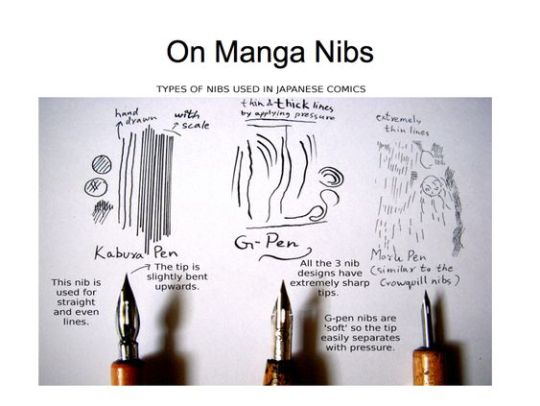
For paper Nekoi uses whatever paper they have at hand to the back of wrapping paper bits of cardboard that have fallen around the back of cosmetics box envelopes from the publisher, the wrapping paper from a cup of tea that is Japanese style. She uses an eraser to reduce the tones in the screentone and sandpaper to reduce the large areas of tone she uses. A fine grit sandpaper will decrease nicely but not allow for fine adjustment which she had to fix with an eraser later. Nekoi loved experimenting with new painting materials; she especially loved painting in color.
Step to Step in Creating Manga
When it comes to drawing manga there are steps taken to create manga. these are the materials they use for drawing manga The list of materials and things they use in the steps to create manga are listed as this
1.) plastic eraser, mechanical pencil 0.5 HB
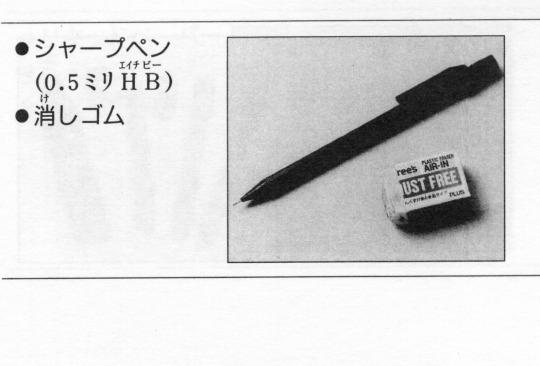
2.) Pigma 0.5, magic marker
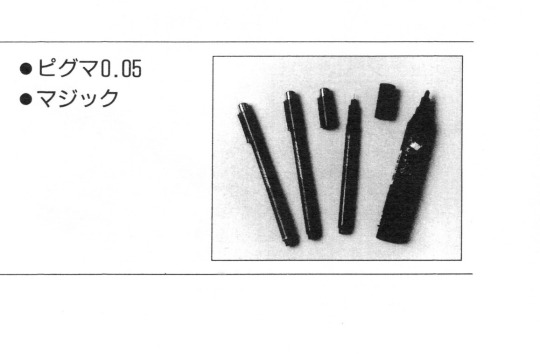
3.) brush pen
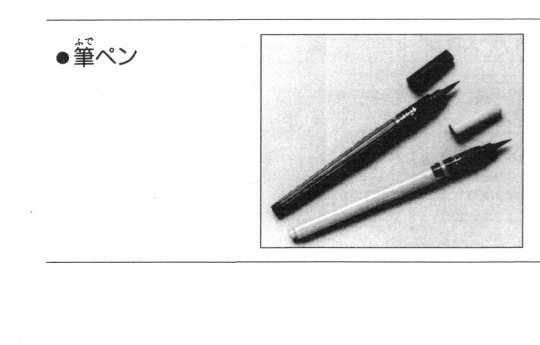
4.) screen tone, tone cutters round sand eraser
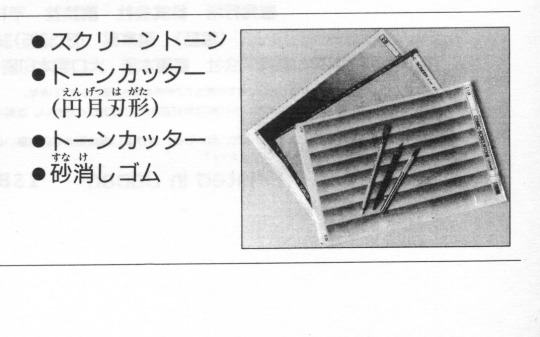
5.) pen white, liquid paper ink, Mython
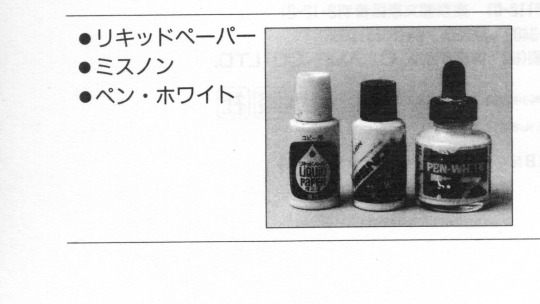
lastly, for writing the script, they use a pc
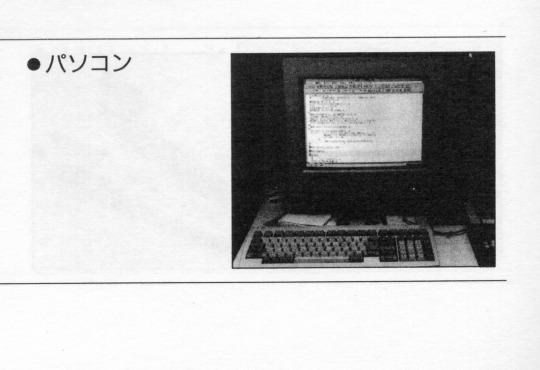
For the steps they use to create manga Rayearth I think it might be the same steps they use to draw other manga that come after it might be the same steps they did for Tsubasa,xxxholic, and other manga that come after it, and the materials they use. I bet it's the same materials used for Tsubasa, Card Captor Sakura and xxxholic.

1.) The plot is written by Ohkawa on a personal computer with manuscript paper, For the rough they draw frames with a pencil and roughly insert characters and other elements, they draw the rough while paying attention to the composition and balance the draw the panel as to what you want to show most when you are doing a specific scene. The rough is a lot of lines and its way is less detailed. The rough is used for the placement to know the place of things to ink. You can see the same rough stage with Tsubasa and xxxholic.
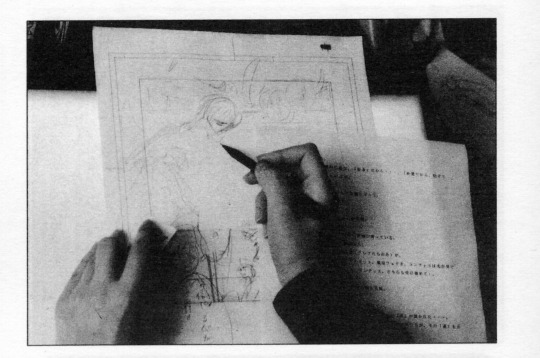
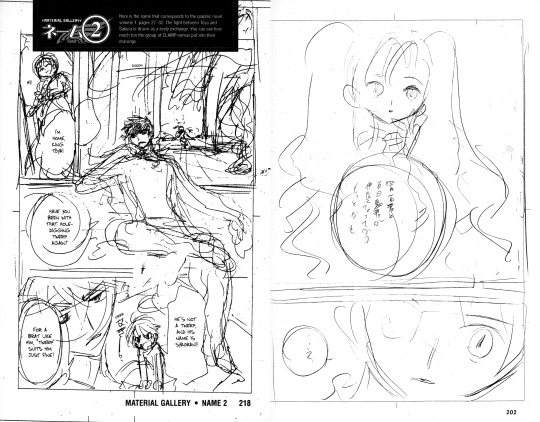
Clamp pays attention to the distribution of lines in the panels, the reason why Clamp pays attention to the number of lines is because it's a manga and they are going to ink over and over again. The reason they pay attention to the number of lines in the rough is to calculate how much you ink while you draw. the number of lines you use while you ink is important because you are going to use it over again
the rough is drawn with a pencil, they used a regular pencil for the rough rather than a mechanical pencil since the mechanical pencil has fine lines
2.) Next is the sketching phase, in the sketching phase the characters are drawn with a mechanical pencil they check the drawing by looking through the rough manuscript and back. Once the sketch is finished the member will fix it until they are satisfied The background is only included briefly in the sketch.
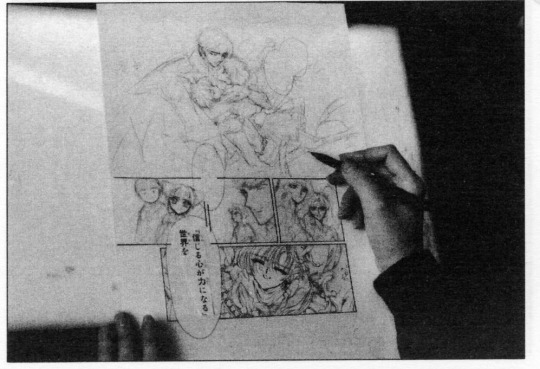
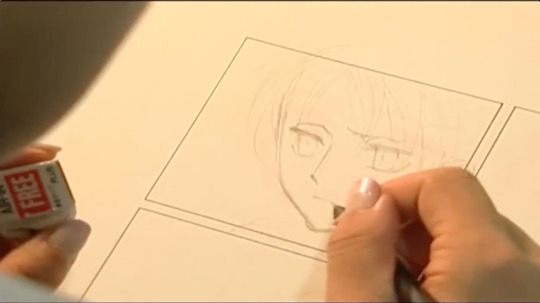
3.) The inking stages for the steps of Magic Knight Rayearth are inked mainly using a Pigma 0.05 or Kaimuji marker or brush. When Mokona was drawing Rayearth Mokona had strong drawing pressure so her lines became thicker She changed pens as soon as she noticed it her strong drawing pressure caused Mokonas tip of her pen to break quickly they often used 4 to 5 bottles a day for inking.
4.) Next up the beta stage, after they are done with inking they erase and check it again After that the members add solids the tool used is a brush pen to fill in areas like hair and stuff. They use ink that is resistant to water because if it is water resistant the area will become thin when the eraser is applied.
The steps for rough and sketch are used in their other works only the materials that are used for inking change consistently Depending on the series
5.) Next is the toning stage when they add screentone traditionally to a manga page, when it comes to screen tone they make sure that no more appears in the overlapped areas Clamp use a circular blade type cut when they apply screentone traditionally to a manga and small areas might be scrapped with a sand eraser scrapping the tone can change the texture of the object. They consider the effect and carefully cut it and their grain to the tone and know in which its neatly scrapped directions are not scrapped.
In Rayearth tint and gradation tones are used, and a little gala for the screen tone of the manga.
6.) This is the last stage of Clamp creation in drawing manga. The last stage is to express light and create glamorous images white is used for it. when applying white fluid to the image which is done by flicking the brush on the correction fluid with the rim of the container the effect changes depending on the concentration of the liquid. You can add white to the toothbrush or flick it with your finger. It changes the effect of the image. If you add fine white dilute it with water to adjust for the white. Clamp uses quirk drawing because the pen can be put on the white later.
This technique was applied in other manga like Tsubasa, Card Captor Sakura, and their other works. They used the same white ink to make a beautiful panel.
Next
#clamp#x/1999#meta#card captor sakura#card captor clear#tsubasa reservoir chronicle#chobits#tsubaki nekoi#Nanase Ohkawa#Satsuki Igarashi#Mokona#magic knight rayearth#xxxholic#kobato#angelic layer#tokyo babylon#my meta
639 notes
·
View notes
Text
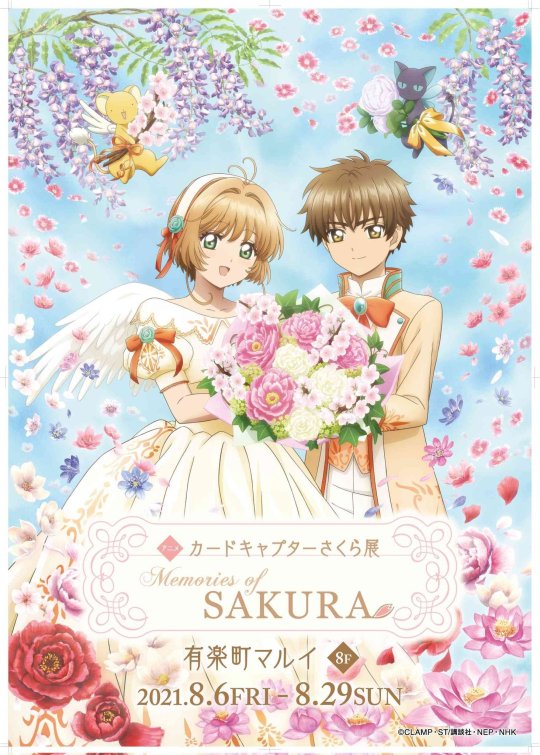
#oficial art#old art#clear file#sakura ccs#cc sakura#sakura cc#ccsakura#ccs#ccs clear card#clear card arc#clear card#sakura card captor#clamp#clamp manga#kinomoto sakura#sakura clear card#ccs sakura#cardcaptor sakura#card captor sakura#card captor clear#sakura kinomoto#shaoran li#li shaoran#ccさくら#カードキャプターさくら#sakura card captor clear card#kerberos#kero chan#kero#spinel
294 notes
·
View notes
Text
Why are cardcaptor Sakura figures so pretty like what are these people being fed put these in anime museums





#cardcaptor sakura#ccs#ccsakura#card captor sakura#sakura card captor#sakura kinomoto#anime figure#anime figurine#anime figures#anime merch#anime and manga#90s anime#clear card arc
239 notes
·
View notes
Text


Daidouji Tomoyo & Kinomoto Sakura ; Card Captor Sakura ☆ Good Smile Arts Shanghai
#daidouji tomoyo#tomoyo daidouji#ccs tomoyo#tomoyo#sakura#sakura figure#ccs sakura#kinomoto sakura#sakura kinomoto#ccs#ccs figure#card captor sakura#card captor sakura figure#card captor clear#cardcaptor sakura#cardcaptors#card captor sakura clear card#cardcaptor sakura clear card#good smile company#gsc#pop up parade#good smile arts shanghai#anime#anime figure#anime figurine#figure#figure collecting#scale figure#figurine#anime collecting
227 notes
·
View notes
Text
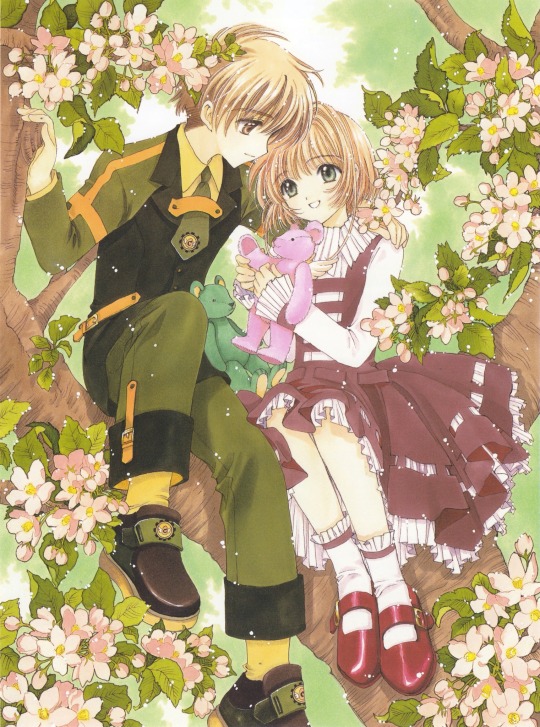
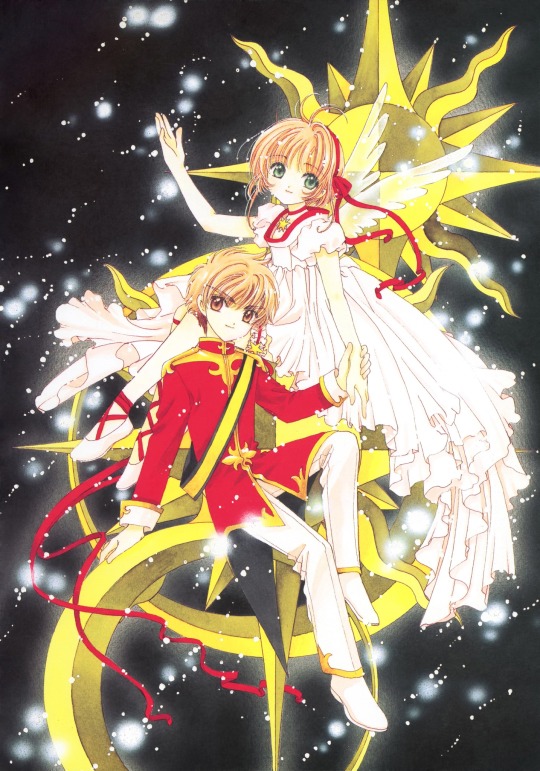
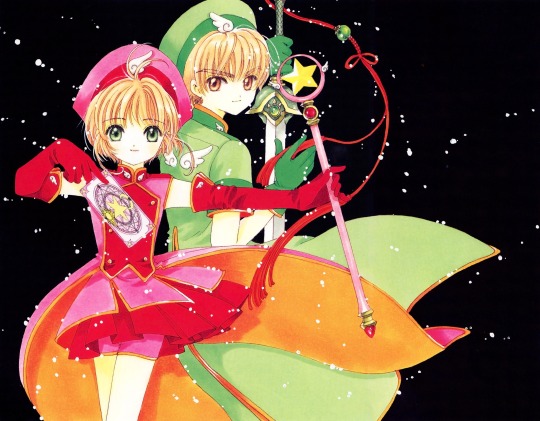
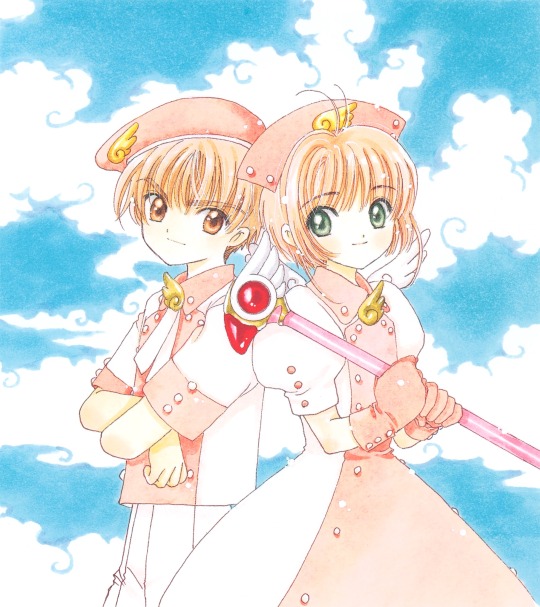
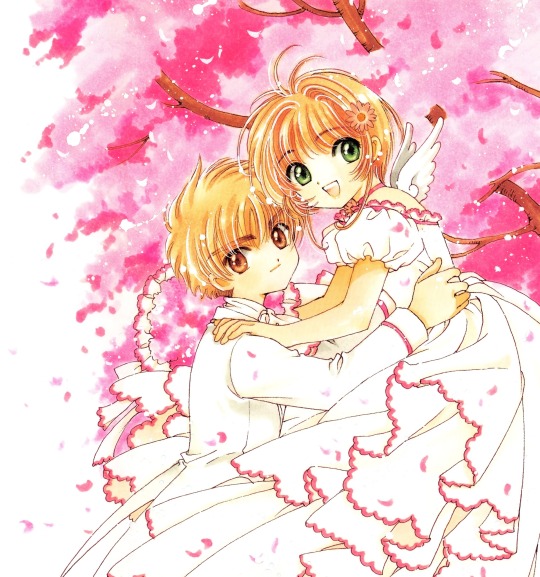
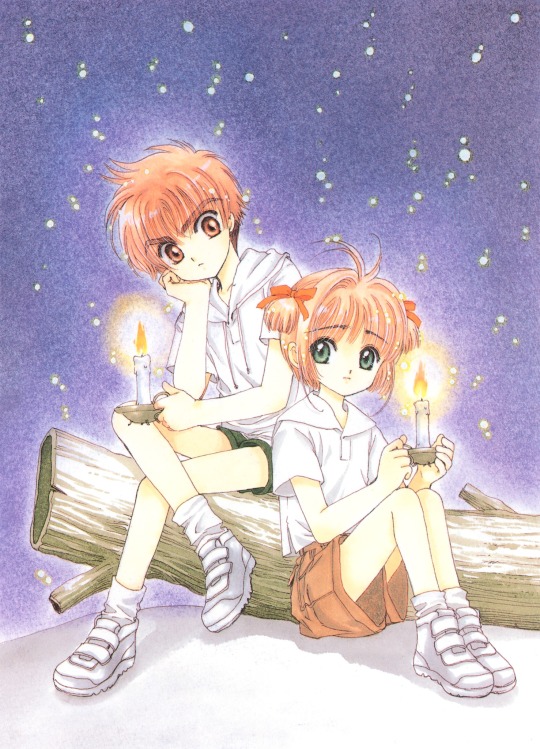
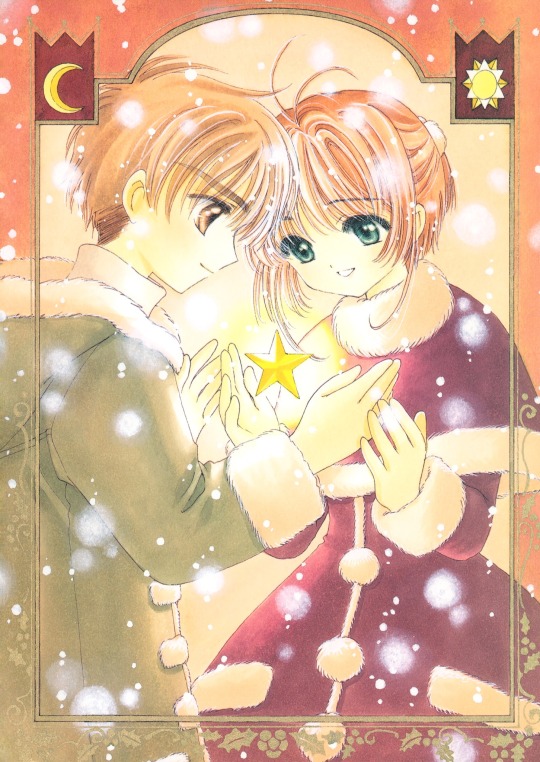
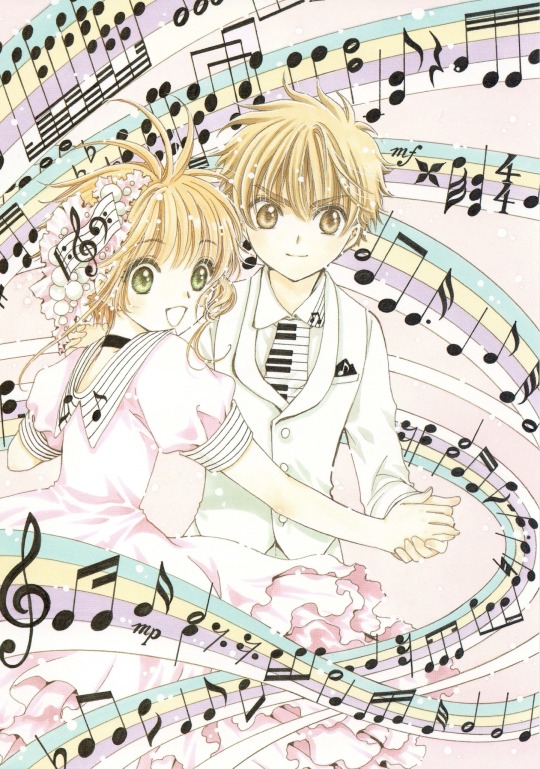
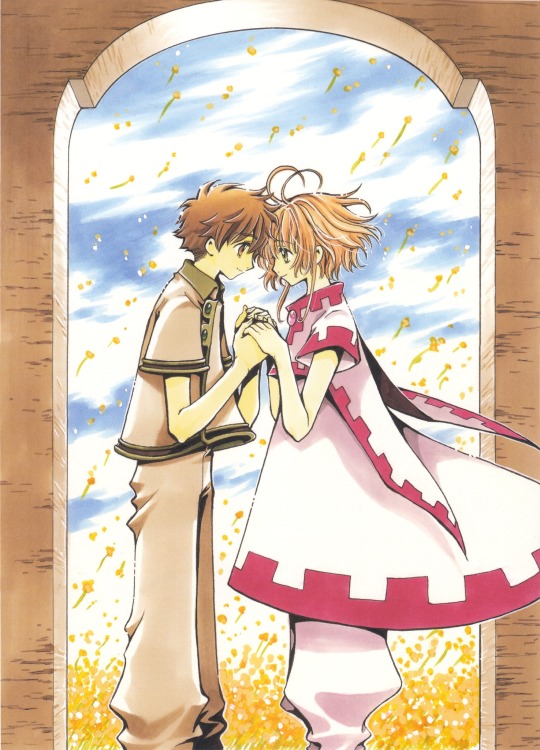
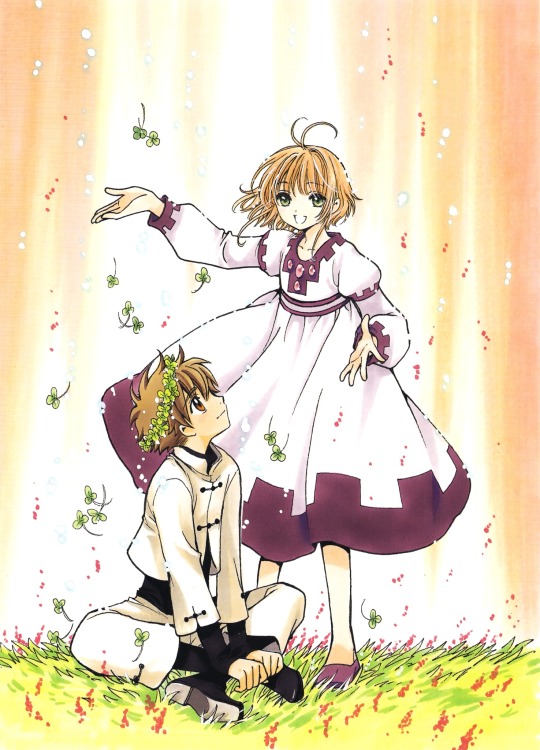
CLAMP - young Sakura & young Syaoran
#cardcaptor sakura#cardcaptor clear card#card captor sakura#syaosaku#sakura x syaoran#sakura#sakura kinomoto#princess sakura#syaoran#li syaoran#syaoran li#clamp#clamp manga#clamp anime#clamp in wonderland#card captor clear#tsubasa reservoir chronicle#tsubasa chronicles#tsubasa chronicle#tsubasa rc
1K notes
·
View notes
Text







🧁🍔
#sakura cardcaptor icons#sakura card captor#messy headers#anime layouts#anime icons#messy packs#messy icons#dividers#anime headers#anime packs#manga icons#manga layouts#sakura icons#sakura layouts#soft icons#edgy moodboard#random bios#cute icons#sakura headers#sakura clear card#cardcaptor clear card#cartoon icons#twitter layouts#kaomoji#messy dividers#coquette#sakura kinomoto#木之本桜#kinomoto sakura#anime pfp
290 notes
·
View notes